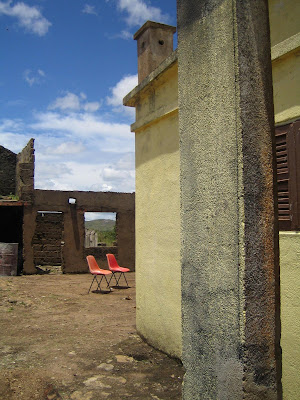Last week I went with colleagues to a funeral held for the sister of a colleague. It was a tragic death: his sister, only 34 with two young children, was outside washing dishes when the loose stone wall holding up the hillside collapsed, immediately killing her. The wall was illegally constructed by a neighbor who had powerful connections that protected him when others complained about the instability of the wall. All it took was one night of heavy rain for it to come down. The funeral was unlike anything I’ve ever seen, but I really don’t think that I can do it justice here.
What happened on the way back to the office is much easier to explain. There were 5 of us in the Land Cruiser, with me sitting in the front seat. In Angola and other developing countries, white Land Cruisers are synonymous with international NGOs. As we approached one of the commercial areas of town, we were flagged down by two people: one uniformed, female police officer and one plainclothes bureaucrat. Instead of asking for Ben’s (my Angolan colleague) driver’s license, they asked to see the personal identification of everyone in the car. I looked at the plainclothes bureaucrat’s badge, and it read DEFA, the dreaded arm of the Angolan government that deals with foreigners and their visas, the very department that has been causing me so much trouble lately! With the white Land Cruiser and me in the front seat, we were easy targets.
I had a slight moment of panic, because I had just cleaned out my purse from my South Africa trip the night before and removed my passport. I was relieved to find that I had a copy of my passport and DEFA stamp authorizing the extension of my visa. I did not have, however, a copy of my actual visa. I handed the papers over and hoped for the best.
Perhaps he sensed my apprehension, because before even looking at the papers, he said, “This is not good.” He didn’t even bother to look at everyone else’s identity cards. He asked to see a copy of the visa and when I couldn’t produce it, he shook his head. “Vai ficar detida,” he said. “She will be detained.” The female cop came around to my door and put her hand on the handle, either to open the door and get me out or make sure that I wouldn’t flee the scene. Ben explained that I was out of the country and had just returned to Lobito, and that I did have a visa, it was just with my passport at home. After much arguing, the guy allowed us to leave Ben’s identification with them as guarantee that I could go home, get my passport and return.
We dropped our colleagues off at the office and sped to my house to get my passport. We handed the passport to the DEFA cop and waited as he read it. He looked at all the stamps, then looked at me, and said, “What are you doing here?” Before I could answer, Ben said, “She’s here visiting,” which is exactly the answer I was told NOT to give. I am supposed to tell people that I am here as a consultant, a position that does not require a work visa but allows me to be in the country for longer than a tourist stay. “What?! That’s impossible!” the DEFA cop said. I piped up and said that I was a consultant. He then said, “You’ve been here too long. You need to get a work visa.” There were several things I could have said about the lack of cooperation from his department on this very matter but I chose to play dumb and say, “Oh yes, it’s true. É verdade.” He then asked to see my consultant paperwork from DEFA. This was the first I’ve heard of any such paperwork and said as much. He said, again, “Então vai ficar detida.” “So you will be detained.” This time the female police officer didn’t move and just sort of looked at the DEFA guy as if the say, “Come on!” They finally let us go.
Upon return to the office I found out that the consultant paperwork is something the employer files and keeps on record, nothing that I have to carry around with me. Later in the day, Angolan several coworkers reported that they too were stopped in the Land Cruisers and other foreigner friends were also stopped.
What’s the deal? Is it related to this lady in Cabinda? Is it related to the new law in Portugal prohibiting Angolans driving with Angolan driver’s licenses, prompting the Angolan government to enact a similar law outlawing Portuguese licenses, effectively immediately? (Here's a link to an article in Portuguese. This has caused quite a debate in the country, and the Portuguese residing in Angola are not happy about this reciprocal law. The new law means that Portugal no longer recognizes driver permits from Lusophone countries that are not a party to Vienna Convention on Road Traffic- like Angola.) Who knows. I now carry my passport around with me at all times, which makes me nervous, but I have no other option. I used to not worry about these things and often left the house without even a copy of my passport to go the store, but the thought of spending any time in Angolan police custody is enough to change that!








